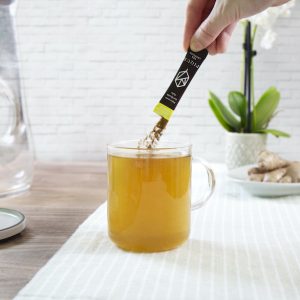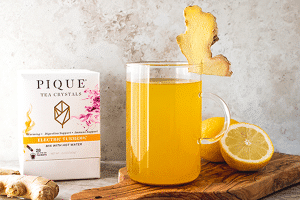- Ginger is packed with vitamins and minerals and has been used for centuries to support healthy immunity, digestion, and more!
- Drinking ginger tea is one of the easiest (and tastiest!) ways to reap the health benefits of ginger root
- If you don’t love the bold, spiciness of pure ginger tea, tone it down with a natural sweetener or steep it into your favorite green tea
You may know it for the zesty punch it adds to your sushi, or the kick of flavor it lends to so many dishes in Indian cuisine. But ginger root is so much more than a flavor enhancer! It makes a divine herbal tea, chock full of potential health benefits.
Ginger: more than just a spice
Ginger is rich in health-promoting compounds like vitamin C, amino acids, and various trace minerals like calcium, zinc, sodium, phosphorus, and more.
Ginger has been used for centuries as a natural remedy for many ailments — it is, in fact, regarded as one of the healthiest spices around! And one of the best ways to enjoy these benefits is by drinking a cup of ginger tea.
So move over green tea – ginger tea is one of the simplest (and most soothing!) ways to avail yourself of a myriad of health benefits.
6 Benefits of ginger tea:
-
- Soothes an upset stomach
- Supports natural inflammatory response
- Supports digestion
- Supports immunity
- Supports healthy blood sugar levels
- Supports brain health
Keep reading for more on these benefits – as well as some unique ginger tea recipes.
6 Health Benefits of Ginger Tea
1. Soothes an upset stomach
Were you ever given ginger ale when you had an upset tummy as a kid? Or maybe someone gave you ginger tea to soothe your nausea or motion sickness?
People have turned to ginger for its stomach-calming benefits since ancient Greek and Roman times. (1)
Modern science is in agreement. Research has shown that ginger can help to settle the stomach under a variety of circumstances, ranging from being sick to being pregnant and even seasickness.. (2) (3)
Many pregnant women enjoy ginger tea as a home remedy for morning sickness.
2. Supports natural inflammatory response
Ginger is well-loved by dietitians and often included in their lists of “anti-inflammatory foods,” and for good reason. It contains the compound “gingerol” which is very effective at supporting your body’s natural anti-inflammation response. (4)
Ginger has also been found helpful in some instances of muscle pain. (5)(6)
Do you ever experience muscle soreness or cramps after exercising? Ginger tea can help with that too, according to one study. (7) What about menstrual discomfort? Another study showed that ginger root extract may support the management of menstrual discomfort. (8)
3. Supports digestion
If you ever suffer from any digestive distress, such as upset stomach, indigestion, heartburn or bloating, you may want to try ginger tea.
Ginger actually stimulates the muscles of your intestines. This is also known as digestive motility, and it helps your body break down food particles and move food and other substances out of your digestive tract. The result? Quicker, more comfortable digestion and less bloating and gas.
4. Supports immunity
A healthy immune system just might be waiting for you at the bottom of a cup of ginger tea. Ginger has demonstrated antiviral, antibacterial and antifungal properties, not to mention vitamin c. This makes it an excellent natural remedy for supporting a healthy immune system. (11) (12) (13)
How exactly does ginger do all that? The ginger root contains compounds called gingerols, shogaol and paradols. These cool little compounds are capable of supporting your body’s fight against inflammation and free radicals. (14)
5. Supports healthy blood sugar levels
Maintaining healthy blood sugar levels is important for so many reasons.
Keeping your blood sugar in check can give you more energy, help manage cravings, can aid in weight management, and help you sleep better. And ginger tea can be a secret weapon in keeping your blood sugar levels healthy. (15)
Adding a daily dose of ginger to your diet has been proven to have long-term benefits in supporting healthy blood sugar. (16)(17)
6. Supports brain health
Consuming ginger has also been linked to supporting your brain health. One study using ginger extract demonstrated supported cognitive function and enhanced working memory. (21)

Traditional Uses of Ginger Tea
Ginger has been used for centuries in both Ayurvedic and Traditional Chinese Herbalism.
In Traditional Chinese Medicine, it is considered to be a “warming” spice, helping support yang energy and disperse cold in the body.
This “pungent” spics is considered to be a qi tonic that can support blood circulation (to the point of inducing sweating) and it can also be used to warm the stomach, spleen, and lungs.
In alternative medicine theory, ginger has long been used for its purported ability to support healthy blood pressure levels and also for helping to support the body’s natural pain relief mechanisms (everything from menstrual pain to joint pain).
Here’s our recommendation for a high-quality ginger tea:

Pique Ginger Digestion Elixir
Spicy, tangy and caffeine-free. More soothing and warming than your fuzzy socks. Keep your tummy happy.
How to Make Ginger Tea
Making a basic cup of ginger tea is simple — all you need is sliced fresh ginger root and water! Here’s a recipe for homemade ginger tea:
Ingredients:
-
- 4 to 6 thin slices of peeled, raw ginger (add more for stronger ginger flavor)
- 2 cups water
- Sweetener or flavor enhancers (optional): a teaspoon of maple syrup, fresh lemon juice
Instructions:
-
- Peel the ginger root and slice thinly.
- Combine water and sliced ginger in a medium pot over the stovetop. Place the ginger slices in the water and bring to a gentle boil for 10 to 20 minutes (the longer it simmers, the stronger and spicier the ginger tea).
- Remove from heat and let cool slightly. Strain out the ginger pieces and enjoy!
In a pinch, you can use ginger tea bags, sliced fresh ginger root, grated ginger, or even ginger powder. Simply combine with boiling water, and voila! You’ve got a warm and cozy cup of ginger tea with minimal prep time.
If you’d like a little more pizazz, or just don’t like the taste of pure ginger tea, try these fun and easy recipes…
5 Ginger Tea Recipes to Try
1. Add turmeric for a sniffle-fighting tonic
Sniffle season is the worst. Keep a few simple ingredients on hand, and you’ve got a natural remedy to battle the worst of it: ginger, lemon, cardamom, turmeric, black pepper, and honey.
Turmeric has long been used in ayurvedic herbalism to support a healthy immune system response.
Gently simmer some fresh ginger root and turmeric in a pot of boiling water for about 10 minutes. Then strain the hot water into a mug and add lemon, honey, and pepper to taste.

2. Add apple and cinnamon for a sweet and spicy drink
Craving something comforting on a cold night? Spice up your ginger tea by brewing ginger slices with a few slices of apple and a cinnamon stick. It’s a much healthier twist on hot apple cider!
3. Add maple syrup for a sweeter treat
If you’re not a huge fan of the flavor of raw ginger, but you love ginger ale, a ginger tea sweetened with maple syrup could be just the cup for you. Don’t have or like maple syrup? Using stevia or honey as a sweetener works well too.
4. Add it to your favorite green tea
Any green tea lovers out there? Liven up your favorite brew with a little fresh ginger root! You’ll get a little boost of caffeine (plus the myriad of well-known health benefits) from the green tea, plus the added flavor and unique benefits of ginger tea… win-win!
5. Add mint and serve over ice tea for cooling refreshment
Let’s face it, not everyone loves hot ginger tea, especially when it’s hot out. Try a refreshing variation of ginger iced tea by adding some mint leaves, they provide an extra-cooling kick.
What are the Side Effects of Ginger?
It’s a natural root, so can you be confident of the safety of ginger? Given how frequently ginger is being recommended by complementary and alternative medicine (or even by your local nutritionist), there are potential adverse effects of ginger consumption of which you should be aware.
Pregnant women should be careful when taking ginger to help with morning sickness, because it’s possible that high doses of ginger could increase the risk of miscarriage.
You should also be aware of potential drug interactions. Consuming more than 4 grams of ginger per day (that’s a lot of cups of tea!) can act as a blood thinner, so anyone with a bleeding or blood clotting disorder should be careful. For the same reason, doctors recommend avoiding ginger within two weeks prior to undergoing surgery or giving birth.
You should always consult your doctor or healthcare provider for medical advice regarding any concerns about how much ginger tea is safe for you. This is especially true if you are breast-feeding or have any heart conditions. You should also inform your doctor if you are taking anticoagulants or diabetes medications.
Final Thoughts
The health benefits of ginger tea are plentiful and have been well-documented for centuries. There’s a good reason it’s among our culture’s most well-loved home remedies. Fun fact: many people even throw ginger into their morning smoothie to get these benefits on the daily!
Of course, if you’re looking to add the effects of ginger to your wellness regimen, there’s no easier way than brewing a cup of ginger tea. When you really need the convenience-factor, use tea bags or ginger powder!
If the flavor of ginger doesn’t appeal to you (you’re not alone!) you can always add some honey, fresh lemon, or even peppermint to your cup of tea. Enjoy!

